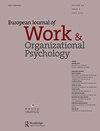Trajectories of employees’ learning intentions and training opportunities in relation to job insecurity and psychological contract breach
IF 4
2区 心理学
Q2 MANAGEMENT
European Journal of Work and Organizational Psychology
Pub Date : 2023-05-17
DOI:10.1080/1359432X.2023.2214317
引用次数: 0
Abstract
ABSTRACT Employees need to continuously refine and broaden their skill sets throughout their careers to increase their flexibility in the ever-changing labour market. We explore longitudinal profiles of the extent to which employees are willing (i.e., one’s learning intention) and able (i.e., one’s training opportunities) to participate in formal development activities. We investigated the role of job insecurity as a predictor, and psychological contract breach as an outcome, of these trajectories. We used three-wave longitudinal data over a one-year period from 846 Belgian employees. Latent class growth analysis revealed four profiles: decreasingly able but continuously not willing (27%), continuously neither able nor willing (3%), continuously moderately able and decreasingly willing (15%) and continuously able and decreasingly willing (55%). When employees had higher job insecurity scores, they had a higher likelihood of belonging to the continuously moderately able and decreasingly willing trajectory. This indicates that while individuals in an uncertain job situation have a higher, but slightly decreasing, learning intention, they consistently view limited opportunities to do so. Moreover, trajectories characterized by stable and low training opportunities had higher perceptions of psychological contract breach.员工学习意向和培训机会轨迹与工作不安全感和心理契约破裂的关系
摘要:员工需要在整个职业生涯中不断完善和拓宽自己的技能,以提高他们在不断变化的劳动力市场中的灵活性。我们探索了员工参与正式发展活动的意愿(即学习意愿)和能力(即培训机会)的纵向概况。我们调查了工作不安全感作为这些轨迹的预测因素和心理契约破裂作为结果的作用。我们使用了846名比利时员工一年内的三波纵向数据。潜在阶级增长分析揭示了四种情况:能力下降但持续不愿意(27%)、持续既不能力也不愿意(3%)、持续中等能力和不断下降的意愿(15%)以及持续能力和不断降低的意愿(55%)。当员工的工作不安全感得分较高时,他们就更有可能属于持续适度能力和意愿下降的轨迹。这表明,尽管处于不确定工作环境中的个人的学习意愿更高,但略有下降,但他们始终认为这样做的机会有限。此外,以稳定和低培训机会为特征的轨迹对心理契约破裂的感知更高。
本文章由计算机程序翻译,如有差异,请以英文原文为准。
求助全文
约1分钟内获得全文
求助全文
来源期刊
CiteScore
8.00
自引率
2.30%
发文量
40
期刊介绍:
The mission of the European Journal of Work and Organizational Psychology is to promote and support the development of Work and Organizational Psychology by publishing high-quality scientific articles that improve our understanding of phenomena occurring in work and organizational settings. The journal publishes empirical, theoretical, methodological, and review articles that are relevant to real-world situations. The journal has a world-wide authorship, readership and editorial board. Submissions from all around the world are invited.

 求助内容:
求助内容: 应助结果提醒方式:
应助结果提醒方式:


